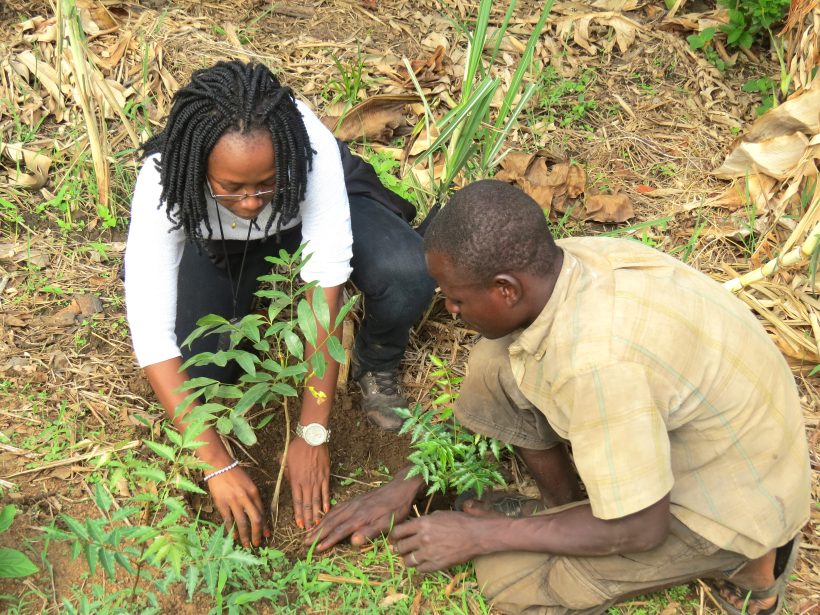
(photo caption) Dr. Eméline S.P. Assèdé engaging local farmers in planting Khaya tree species.
Africa contributes just 3% of global emissions but disproportionately suffers from climate change. Heavy rains, floods, and prolonged droughts heavily impact agricultural communities and economies, increasing food-insecure populations.
In West Africa, climate change and food security challenges loom large. A 2021 report by the World Bank reveals that up to 32 million people could be displaced in West Africa due to climate change.
Dr. Eméline S.P. Assèdé, a 2021 One Planet Laureate Candidate and an Associate Professor of Conservation Ecology and Forest Management, is working to eradicate these harsh realities. She recently won a grant to lead research on sustainable management of Isoberlinia woodland and plantations to build the capacity of local actors and improve ecosystem services for the Sudanian and Sudano-Guinean zones of Benin.
Eméline explains that woodland is Benin’s most important vegetation type, accounting for 38.4% of the land cover. This forest vegetation, dominated by Isoberlinia tree species, contributes to maintaining biodiversity and, above all, the socio-economic development of local populations. Isoberlinia doka and Isoberlinia. tomentosa are two tree species generally exploited for energy sources and medicinal purposes.
Eméline notes that the forests play a pivotal role in Benin’s ecosystem and the livelihoods of its smallholder farmers. The trees are vital for firewood, charcoal, construction, and herbs, making them central to the socio-economic development of local communities. However, their unchecked exploitation has led to soil degradation, loss of biodiversity, and, ultimately, a heightened vulnerability to climate change.
Eméline’s research seeks to reverse this trend by building the capacity of local actors, including farmers and carpenters, to manage Isoberlinia woodlands sustainably. The research is ambitious and multifaceted, aiming to establish a permanent Isoberlinia open forest management center, influence policies, and promote gender equity.
“I am passionate about forestry and have worked on woodland ecology and use by local populations since 2006. Through this project, I expect to produce concrete sustainable management and restoration strategies and impact the national policies for the sustainable management of Isoberlinia woodlands,” she says.
One crucial aspect of Eméline’s project is the collaboration with local farmers. She emphasizes that because farmers are clearing massive plots of forest cover for farming, restoration and climate-resilient solution strategies are even more imperative.
She uses a participative approach to train the local farmers in Isoberlinia seedling production and sustainable agroforestry techniques to ensure they are actively involved in restoring the woodlands while protecting their livelihoods.
For Eméline, the success of this research project means achieving several milestones that will benefit local communities and contribute to broader climate resilience efforts in Benin. These include the development of sustainable Isoberlinia woodland management strategies, a technical guide for seedling production, and sustainable exploitation techniques.
Her dedication to inclusive research and collaboration is a testament to her commitment to transforming Africa’s agriculture and resilience. She is preserving the woodlands and empowering communities to thrive in a changing climate by bridging the gap between science and local knowledge.
